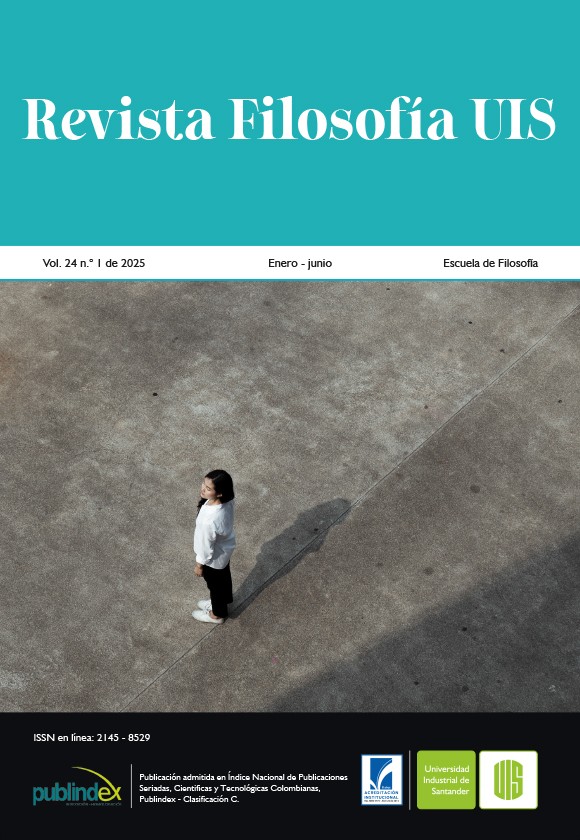english Substance Kinds in the Correspondence Between Elisabeth and Descartes
Published 2025-01-22
Keywords
- order,
- kind,
- degree,
- cause
How to Cite
Copyright (c) 2025 Revista Filosofía UIS

This work is licensed under a Creative Commons Attribution 4.0 International License.
Abstract
This article investigates one of the modifications between the French and Latin editions of Descartes' Meditations on First Philosophy. It is posited that in the Third Meditation, the use of the French terms ‘ordre’, ‘degré’, and especially ‘genre’, instead of the isolated Latin term ‘ordinis’, was influenced by the correspondence with Elisabeth of Bohemia in the year 1643, in which three primitive notions are presented: of the soul, body, and their union. This textual expansion aims to make it more evident that the argument within which the use of these terms pertains to the classification of ideas into the kinds of substance they belong to: thought, extension, or their union. The consequence of this interpretation is the connection between the appropriate genre of substance and the ontological cause of that substance’s primitive notion.
Downloads
References
- Angarita Cáceres, R. G. (2023). El discurso del método o el discurso de los métodos. Revista Filosofía UIS, 22(1), 17-36. https://doi.org/10.18273/revfil.v22n1-2023001
- Blanchet, L. de F. R. (2021a). A função do conceito de causa eminente no §23 da 3ª Meditação. Ipseitas, 7(1), 48-61. https://www.revistaipseitas.ufscar.br/index.php/ipseitas/article/view/425/pdf_194
- Blanchet, L. de F. R. (2021b). O Princípio Da Causa Da Criação Aplicado À Teoria Das Ideias De Descartes. Síntese - Revista De Filosofia, 48(152), 625-648. https://doi.org/10.20911/21769389v48n152p625/2021
- Coelho, R. T. (2020). Descartes e Elisabeth: O Problema das Ações Voluntárias. Cadernos Espinosanos, (43), 399-427. https://doi.org/10.11606/issn.2447-9012.espinosa.2020.172937
- Descartes, R. (1905-1911). Oeuvres de Descartes (12 Vols.), (C. Adam & P. Tannery, eds.). Leopold Clerf Editeur.
- Descartes, R. (1977). Règles Utiles et Claires pour la Direction de l’esprit en la Recherche de la Vérité. (J.L. Marion, trad.). Nijhoff.
- Descartes, R. (1983). Os Pensadores: Descartes (3ª ed.). (B. Prado Junior & J. Guinsburg, trads.). Abril Cultural.
- Descartes, R. (1985) The Philosophical Writings of Descartes (3 Vols.). (J. Cottingham, R. Soothoffe & D. Murdoch, trads.). Cambridge University Press.
- Descartes, R. (1989). Regras para a Direção do Espírito. (J. Gama, trad.). Edições 70.
- Descartes, R. (1992). Méditations Métaphysiques Objections et Réponses. (J.M. Beyssade & M. Beyssade, trads.). Flammarion.
- Descartes, R. (1998). Dos Princípios de Filosofia Primeira Parte sobre os Princípios do Conhecimento Humano (G. A. Almeida, trad.). Revista Analytica, 3(2), 76-99. https://revistas.ufrj.br/index.php/analytica/article/view/431/388
- Descartes, R. (2004). Meditações sobre Filosofia Primeira. (F. Castilho, trad.). Editora Unicamp.
- Elisabeth & Descartes, R. (2007). The Correspondence Between Princess Elisabeth of Bohemia and René Descartes. (L. Shapiro, trad.). University of Chicago Press.
- Gaukroger, S. (1980). Descartes’ Project for a Mathematical Physics. In S. Gaukroger (ed.), Descartes Philosophy, Mathematics and Physics, (pp. 97-140). The Harvester Press.
- Gilson, E. (1964). Index Scolastico-Cartésien. Burt Franklin.
- Guéroult, M. (2007). Lógica, Arquitetônica e Estruturas Constitutivas dos Sistemas Filosóficos (P. J. Almeida, trad.). Trans/Form/Ação., 30(1), 235-246. https://revistas.marilia.unesp.br/index.php/transformacao/article/view/944
- Jesus, P. B. M. (2017). Correspondência entre Descartes e a Princesa Elisabete. Cartas sobre a União Substancial. Discurso, 47(2), 193-203. https://doi.org/10.11606/issn.2318-8863.discurso.2017.141440
- Kant, I. (2001). Crítica da Razão Pura (5ª ed.). (M. P. dos Santos & A. F. Morujão, trads.). Fundação Calouste Gulbenkian.
- Landim Filho, R. (1992). Evidência e Verdade no Sistema Cartesiano. Edições Loyola.
- Marion, J. L. (1975). Sobre a Ontologia Cinzenta de Descartes - Ciência Cartesiana e Saber Aristotélico nas Regulae. (A. P. Silva & T. Cardoso, trads.). Instituto Piaget.
- O’Neill, E. (1987). Mind-Body Interaction and Metaphysical Consistency: A Defense of Descartes. Journal of The History of Philosophy, 25(2), 227-245. https://muse.jhu.edu/article/226712/pdf
- Oliveira, F. P. (2017). Notas sobre o princípio de causalidade na Terceira Meditação de Descartes. Unisinos Journal of Philosophy, 18(1), 12-17. https://doi.org/10.4013/fsu.2017.181.02
- Radner, D. (1985). Is There a Problem of Cartesian Interaction. Journal of The History of Philosophy, 23(1), 35-49. https://muse.jhu.edu/article/226898
- Ramos, C. Da S. (2020, Outubro 22). Elisabeth da Bohemia: Epistolografia e Escrita de Filósofas Mulheres. Enciclopédia Mulheres na Filosofia. https://www.blogs.unicamp.br/mulheresnafilosofia/elisabeth-da-bohemia-epistolografia/
- Rocha, E. M. (2011). Ideias, Juízos e Verdades nas Meditações de Descartes. Em E. M. Rocha & L. Levy L. (eds.), Estudos de Filosofia Moderna (pp. 57-80). Linus Editores.
- Schmaltz, T. M. (2008). Descartes On Causation. Oxford University Press.

